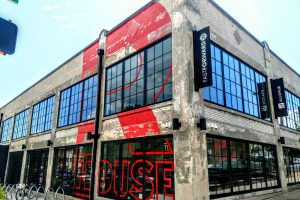
The following was originally published by the Hub.
Johns Hopkins University is set to launch a renewable energy lab above R House in Remington, aiming to grow Baltimore’s reputation as a tech hub for sustainability innovation.
The Johns Hopkins Ralph S. O’Connor Sustainable Energy Institute (ROSEI) secured a state government grant today to establish the energy technology lab on the second floor of R House, the inventive food market in Baltimore’s Remington neighborhood.
The Maryland Department of Commerce’s Build Our Future Grant Pilot Program and Fund awarded the $1.25 million grant to help contribute to ROSEI’s expansion from basic office space to a headquarters called R.Labs that will include 12,000 square feet of research laboratories and an advanced materials discovery and manufacturing process center.
“To make Maryland more competitive, we need to turbocharge those areas of our economy that are producing fresh ideas and innovative new technologies,” Gov. Wes Moore, A&S ’01, said in a statement. “These grants will not only help individual businesses grow but will also help establish tools and resources to support growing industries.”
The R.Labs New Energy/Tech Infrastructure Hub will focus on innovations in energy transition, including carbon management, energy storage, wind power, and grid optimization.
“Johns Hopkins is grateful to Gov. Wes Moore and the Maryland General Assembly for their vision and dedication in harnessing innovation across Maryland to address the effects of climate change and for prioritizing the financial support needed to build the infrastructure essential for transitioning from a brown to green economy,” said Michael Huber, director of Maryland Government Affairs at Johns Hopkins.
Ben Link, ROSEI’s managing director, said the state’s support will help the institute “to build out state-of-the-art labs and create a long-term home.”
“It’s a win for Baltimore because it will anchor a new energy hub in our city and build on Remington’s reputation for entrepreneurship,” Link said. “It’s a win for the state of Maryland as well because energy technology will be a major economic driver in the years ahead, making this a direct investment in stimulating the state-level economy.”
The Build Our Future fund provides grants for innovation infrastructure projects intended to support various sectors, including energy and sustainability. ROSEI, based in the Johns Hopkins Whiting School of Engineering, leads the university’s energy-related research and educational programs.
Construction will begin in July and the final facility will be equipped to research innovations in:
- Portable electric battery design and manufacturing as well as integration of power control systems for offshore wind developments;
- Modeling and simulations of increasing renewables and distributed energy resources;
- The use of artificial intelligence and machine learning to model clean energy challenges in grid optimization, offshore wind, EV battery materials and design, and equitable energy transition policies.
“What I’m excited about with this investment from the state of Maryland is that every test that my group conducts in the facility will be more commercially relevant,” said Regina García-Méndez, an assistant professor in the Department of Materials Science and Engineering and a core ROSEI researcher whose battery technology development lab will be located at the new headquarters. “The state-of-the-art facility will enable new research and attract more researchers and collaborations.”
Other local technology companies or startups without the finances to establish their own advanced labs will also have access to the new space once the renovation is completed in late 2025.
“The Build Our Future Program is a bold new way to accelerate growth in the innovative sectors where Maryland is poised to lead and dominate,” said Maryland Department of Commerce Secretary Kevin Anderson. “These grants will support innovation and spur economic growth across Maryland and help make sure we’re competitive in these key industries.”
Once the renovation is completed, R.Labs will fulfill an aspiration that Ben Schafer, ROSEI’s founding director, has had since the institute launched in 2021. Shortly after the institute was founded, Schafer asked faculty working in sustainable energy how ROSEI could help. The response was unanimous: build an advanced-capabilities clean energy facility.
“R.Labs is the first step in meeting these needs,” Schafer said.